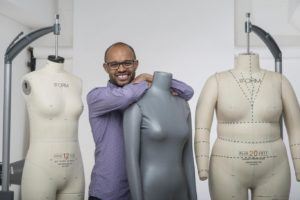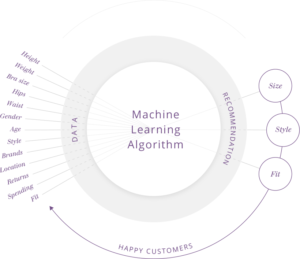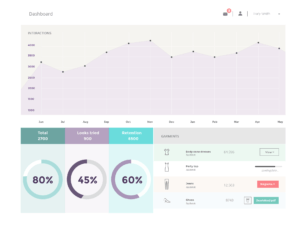One Size Does Not Fit All: Metail’s Virtual Fitting Room

London-based virtual fitting room company Metail provides AR try-before-you-buy solutions and sets out to become the Google of sizing and shape
Founded in 2008 and launched commercially in 2012, Metail has developed a virtual fitting room technology that allows consumers to generate a 3D model of themselves, the “MeModel”, by uploading a photo and entering just a few key body measurements (height, weight, age, bra size, bust, waist and hips). The result is an image that reflects size and shape with 92% to 96% accuracy and the ability to rotate and change hairstyle. Selected items of clothing are then superimposed over the models, and can be viewed from 360 degrees (see images).
Its founder and CEO Tom Adeyoola (see portrait of him), an economics graduate from Cambridge and former Head of Gaming at Inspired Gaming Group, had the idea for his company after his wife complained about her clothes-buying experiences. Metail’s growth has been rapid. The initial $75,000 of funding from “friends, families and fools” has become a pot of $20 million; in its latest round in 2014, Metail raised $12 million in funding with a new lead investor, TAL Apparel of Hong Kong-based TAL Group, a global leader in garment manufacturing and responsible for making 1 in 6 men’s dress shirts. In 2015, Metail won the “IBM Commerce Ecosystem Technology Innovator of the Year” and, in 2016, became one of the first 30 companies to be involved in the “Tech City UK Upscale Program – A network of founders, scaling faster, scaling together”.  Metail’s team consists of about 60 people, including 14 PhDs, and is based in London, United Kingdom with additional offices in Cambridge and Singapore. The service is available on mobile, tablet and desktop, and only caters to creating women “MeModels”. The virtual fitting room technology solution is typically sold to retailers, who rebrand it so the end-consumer sees it integrated into the store’s e-commerce platform. Partner retailers have included Tesco, Zalando, House of Holland, Warehouse, Rocket Internet’s Dafiti and an increasing number of Asian retailers, e.g. Thailand’s BeesYou, India’s abof.com and Singapore’s SingTel. 750,000 people have already created “MeModels”, and online retailers are expected to digitize up to 200,000 garments with Metail this year, up from 40,000 last year.
Metail’s team consists of about 60 people, including 14 PhDs, and is based in London, United Kingdom with additional offices in Cambridge and Singapore. The service is available on mobile, tablet and desktop, and only caters to creating women “MeModels”. The virtual fitting room technology solution is typically sold to retailers, who rebrand it so the end-consumer sees it integrated into the store’s e-commerce platform. Partner retailers have included Tesco, Zalando, House of Holland, Warehouse, Rocket Internet’s Dafiti and an increasing number of Asian retailers, e.g. Thailand’s BeesYou, India’s abof.com and Singapore’s SingTel. 750,000 people have already created “MeModels”, and online retailers are expected to digitize up to 200,000 garments with Metail this year, up from 40,000 last year.
Value creation
“Seeing something very visual, getting to the clothing most relevant to you really quickly, not being intimidated by infinite choice and having a fun and engaging experience — that’s what we’re trying to deliver,” explained Adeyoola. Through “MeModel” consumers can shop, interact with clothes and get a preview of how garments might drape against their body type so that they end up with clothes they actually want to keep. Furthermore, Metail has developed an intelligent algorithm giving personalized size and style advice based on “MeModel” data, previous purchasing behavior and data of other customers (see machine learning diagram).
Retailers have to cope with fewer returns, while also boosting brand engagement and loyalty. This alleviates a major problem for them; traditionally, up to half of online apparel sales are sent back, often due to poor fitting. In addition, Metail offers data analytics to the online retailers (see consumer insight dashboard), which illustrates how consumer-facing AR applications can drive back-end benefits: “Our big partner in India is using data that is coming through to re-cut their clothes to match the fact that India is not a one-size demographic — people are taller in the North and shorter in the South. They are starting to rethink and recut clothes,” said Adeyoola. “For another retailer, for example, we saw that only 20 percent of their customers matched the clothes that were cut. By resourcing the garments, they could do a better job of matching that demographic.”
Metail is convenient, easy and quick: From the consumer’s point of view, generating the “MeModel” is done from basic information and in only ten seconds. A user only has to create a “MeModel” once as it is portable across supporting sites. From the online retailer’s point of view, digitizing clothing is quick and cheap to avoid having to charge retailers for it. Metail was able to reduce the cost of making 3D images of garments from between $300 and $400 an item to less than $10, and halved the cost of 2D images for catalogues by introducing “Composed Photography. Models only need to be photographed once, whilst the collection is shot separately on custom-made mannequins. Techs then dress the model in the online retailer’s clothing as if she was photographed wearing it.
According to research conducted by Metail in conjuction with Tufts University and the Kellogg School of Management, the Metail’s AR application can boost sales by 22 percent.
Value capture
Metail charges retailers a basic license fee for incorporating the technology into their online shopping portals, and then takes a share of sales.
Going forward
“We want the MeModel to reflect the way consumers buy and then use fashion”, said Adeyoola. That spans ideas such as an advice model that suggests outfits from the consumer’s wardrobe depending on today’s weather, or a styling service to help people find clothing consumers have seen in magazines or just on someone walking down the street. The long-term vision is for Metail to become the “Google of sizing and shape” with data from its 3D visualization technology: The more consumer use the “MeModel” in their clothing related experiences, the better the recommendations and search skills will get through artificial intelligence and “deep learning”. Metail will be the custodian of the world’s size and shape dataset, like Facebook is of the world’s social graph, and become the Google of sizing and shape through being the access channel for users to quickly and easily find and get recommended clothes that they will like and which will look good on them.
However, Metail isn’t the only one tackling the fashion e-commerce fitting problem. A number of startups across Europe are cropping up in this space: Fits.me, founded in 2010, has raised about $14.3 million in funding and offers a similar virtual fitting room solution that involves creating a robot mannequin based on the consumer’s measurement and allowing them to try on clothing to choose the best fit. Bodi.me utilizes 3D scanning and lets shoppers create profiles with a webcam.
With eight patents and 23 pending, Metail should continuously focus on the protection of its intellectual property. However, since the “MeModel” shows promising result, the attention can be shifted slightly from product and technology development to scaling the company. In order to build a platform and preempt competition, Metail needs to build relationships across the fashion retail industry and attract more clients. Furthermore, the company needs to build a consumer-facing mobile app on its own – a departure from simply powering the virtual fitting room offerings of partner retailers – to implement the wardrobe advice model and clothing search service. Then, it should continue its international expansion, which has led the company already to Germany, South America, Singapore, India, Vietnam, Korea and Taiwan. Thereby, it mustn’t forget to keep the digitization process quick and affordable, because the business relies on retailers digitizing all of their clothing offer – that is, mapping the exact sizing online of tens of thousands of garments that come to market every single day.
Sources
Company Homepage. http://www.metail.com
Company Overview of Metail Limited. http://www.bloomberg.com/research/stocks/private/snapshot.asp?privcapid=217057502
Edwin Jiang (Feb 28, 2017): Virtual Reality: Growth Engine for Fashion? https://www.businessoffashion.com/articles/fashion-tech/virtual-reality-growth-engine-for-fashion
Vicki Owen (Feb 25, 2017): Metail’s message to retailers: Try on this tech for size if you really want to make clothes that fit. http://www.thisismoney.co.uk/money/smallbusiness/article-4259972/Try-tech-Metail-size.html#ixzz4fXlQJtxY
Claire Hutchinson (Nov 28, 2016): Entrepreneurs: Goodbye fitting-room blues as Metail adds new dimension to buying fashion online. http://www.standard.co.uk/business/entrepreneurs-goodbye-fittingroom-blues-as-metail-adds-new-dimension-to-buying-fashion-online-a3406421.html
David Prosser (Aug 30, 2016): Meet Metail, The Next Big Thing In Online Fashion. https://www.forbes.com/sites/davidprosser/2016/08/30/meet-metail-the-next-big-thing-in-online-fashion/#3357a26f111b
Charmaine Li (Oct 28, 2014): One size does not fit all: why London-based Metail just raised $12 million for its ‘online fitting room’. http://tech.eu/features/2943/metail-profile-virtual-dressing-room/
Steve O’Hear (Oct 17, 2014): Virtual Fitting Room Startup Metail Raises Further $12M — Shunning UK VC Money Along The Way. https://techcrunch.com/2014/10/17/metail/
Rebecca Burn-Callander (Oct 16, 2014): Virtual fitting room firm raises £7.5m as consumers find new ways to shop online. http://www.telegraph.co.uk/finance/businessclub/11168037/Virtual-fitting-room-Metail-firm-raises-7.5m-as-consumers-find-new-ways-to-shop-online.html
Steve O’Hear (Nov 5, 2012): Metail, The Virtual Fitting Room You’ve Probably Never Heard Of, Partners With Warehouse, Shop Direct, Following Tesco Trial. https://techcrunch.com/2012/11/05/metail-the-virtual-fitting-room-startup/




Very cool topic and well-written post!! I had a good friend who used to have a start-up in exactly this.. She got great traction from a few leading clothing retailers. The main problem she got was similar to what you describe, with an additional twist. She also was forced into thinking about becoming a selling platform (because that was the way she could force more retailers to make her the standard, since everyone in this space is fighting to be the standard). But the biggest problem she had was that technology could in one swoop get her out of business. The rumour that iphone 8 will have two camera’s for instance (and therefore be able to signify depth of an image), could in one instant render most of the company’s IP irrelevant. It’ll be interesting to see if technology will actually help, or block, Metails future. Was a fascinating read!! Great writing style too, really enjoyed the examples. Thanks 🙂